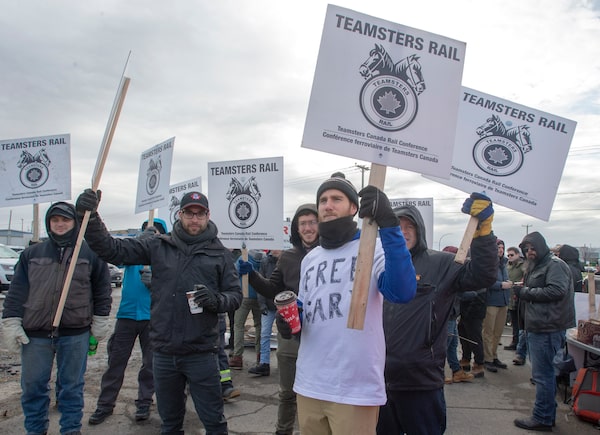
Striking Canadian National Railway workers picket in front of the company's Tashereau railyard Friday, November 22, 2019 in Montreal.Ryan Remiorz/The Canadian Press
Melanie Paradis is a director at McMillan Vantage Policy Group.
What started with coal miners in the United Kingdom may serve as a warning for what could come for Quebec and the rest of Canada this winter. With a new minority Parliament and a Senate in disarray, an inability or unwillingness to act could trigger Canada’s own Winter of Discontent.
In the mid-1970s, the British economy was struggling, a problem compounded by soaring inflation. Wages had not kept pace, so coal miners began job actions across Britain. At a time when most of the country’s electricity was produced by coal-burning power stations, the effect was immediate and severe, touching the lives of families and businesses alike.
Within a month of the initial job actions, the British government temporarily implemented a three-day workweek in order to reduce electricity consumption and conserve coal stocks. Today, in Quebec where propane is used to heat hospitals and long-term-care facilities, energy supplies may similarly need to be rationed if the CN rail strike continues. In such a scenario, it wouldn’t be long before the cold set in.
But it was another series of labour strikes, this time across industries and public services, touching every corner of Britain, that brought down a prime minister. With striking rail workers grinding Canada’s economy to a halt, the 1979 Winter of Discontent warrants reflection.
It was a particularly cold January when unionized truck drivers went on strike across Britain. Gas stations relying on their deliveries went dry and ports country wide picketed. Essential goods, primarily transported by road, became hard to come by and prices went up. In total, more than a million British workers were laid off during these labour actions.
From railways to hospitals to garbage collection, services ground to a halt. Even gravediggers went on strike, resulting in corpses famously being stored in a factory. The winter itself was very cold, with deep snow and blizzards, limiting the ability for many who still had jobs to get to work and further strangling the economy.
Today, an emergency propane shortage is threatening Quebeckers with cold December weather just around the corner. Elsewhere in the country, oil, grain, construction materials and other goods shipped by rail are slowly stopping. So too, will the flow of billions of dollars within our country’s economy. Reports indicate that within a week, Canada’s GDP could take a $2-billion hit. By the time MPs return to Ottawa on Dec. 5, that could increase to $3-billion.
Put into everyday terms, this disruption could quickly affect a wide range of sectors and regions across the country. Construction sites in Toronto may have to halt work for lack of materials. Agricultural products in the Prairies could go bad sitting in depots. Mining jobs in northern communities could feel the effects of stockpiles of minerals unable to get to market. Chemical jobs in Sarnia, Ont., could be pinched, and across Canada, gas prices could increase as supply becomes limited.
Many Canadians may not immediately understand the sweeping ramifications of the CN rail shutdown, but if it continues, they soon will. Whether you work in a Mississauga engineering firm, the stockroom of an IKEA in Coquitlam, B.C. or a used car lot in Moncton, your job depends on the steady and reliable flow of products from coast to coast. If you work in the public sector, your job depends on the government’s ability to collect tax revenues on that flow of products. In Canada, tremendous amounts of those products are shipped by rail. Increasingly, those rail lines have also been shipping a higher volume of oil and gas as our country grapples with an inability to agree on building pipelines.
The CN rail strike poses a tremendous first test for a minority Parliament to respond to the very real needs of Canadian families and businesses. Will the five-party House and the segmented Senate work together or will this become our own Winter of Discontent?
Keep your Opinions sharp and informed. Get the Opinion newsletter. Sign up today.